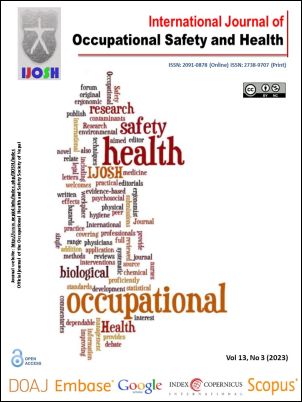Ethical Sensitivity and its Association with Caring Behavior among Healthcare Workers in Delta State, Nigeria: A Cross-Sectional Study
DOI:
https://doi.org/10.3126/ijosh.v13i3.49009Keywords:
Caring Behavior, Ethical Sensitivity, Gender, Moral Responsibility, Moral Strength, Sense of Moral BurdenAbstract
Introduction: Caring behavior is a unique behavior that can promote patients’ well-being, the performance of healthcare workers, and the general effectiveness of healthcare institutions. The mechanism and possible predictors of caring behavior are under-researched in health and organizational behavior literature. Based on the aforementioned, this study examined the predictive effect of ethical sensitivity (dimensions included) on caring behavior, and gender differences in caring behavior and ethical sensitivity among public healthcare workers in Delta State, Nigeria.
Methods: A cross-sectional research design and a quantitative approach for data collection were adopted. Simple random sampling was adopted for selecting the participating hospitals while the convenience sampling technique was utilized for selecting the healthcare workers. Two instruments with good psychometric properties were used for the data collection. The simple linear regression and independent sample t-test were used for testing the hypotheses via the IBM-SPSS v.25.
Results: The participants comprised 150 healthcare workers from public-owned hospitals consisting of 73(48.7%) males and 77(51.3%) females with a mean age of 40.60 years and a standard deviation of 9.30. The results of the study indicated that ethical sensitivity positively and significantly predicted caring behavior. Also, two dimensions of ethical sensitivity, moral strength, and moral responsibility positively and significantly predicted caring behavior while a sense of moral burden did not. Finally, there was no significant gender difference in caring behavior and ethical sensitivity.
Conclusion: This study highlights the role of ethical sensitivity, moral strength, and moral responsibility in predicting higher levels of caring behavior among healthcare workers. Thus, it was recommended that hospital administrators, health policymakers, and practitioners seeking to boost the caring behavior of healthcare workers should focus on enhancing factors such as sensitivity to ethical standards. Also, administrators of medical education can nurture intending healthcare workers (medical students) on the importance of ethics in the medical profession.
Downloads
Downloads
Published
How to Cite
Issue
Section
License
Copyright (c) 2023 Henry Samuel Edosomwan, Chiyem Lucky Nwanzu

This work is licensed under a Creative Commons Attribution-NonCommercial 4.0 International License.
This license enables reusers to distribute, remix, adapt, and build upon the material in any medium or format for noncommercial purposes only, and only so long as attribution is given to the creator.





